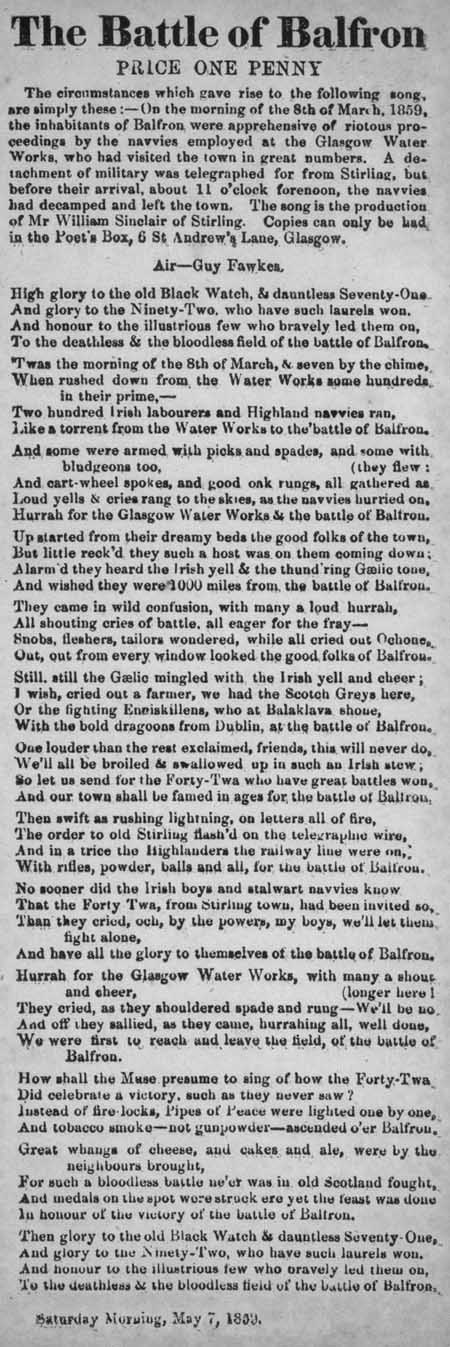
 |
| home | background | illustrations | distribution | highlights | search & browse | resources | contact us |
Broadside ballad entitled 'The Battle of Balfron' |
CommentaryVerse 1: 'High glory to the old Black Watch, & dauntless Seventy-One / And glory to the Ninety-Two, who have such laurels won. / And honour to the illustrious few who bravely led them on, / To the deathless & the bloodless field of the battle of Balfron.' A note above the ballad states that it should be sung to the air of 'Guy Fawkes'. In addition to mentioning the composer of this song, the introductory text also mentions that 'Copies can only be had in the Poet's Box, 6 St Andrew's Lane, Glasgow'. Written in the style of a mock-epic, this light-hearted ballad tells the story of a 'battle' that took place in Balfron between Irish navvies and Highlanders on one side, and various Scottish regiments on the other side. These navvies were working on the Glasgow Water Works, which is a pipeline that carries water from Loch Katrine to Glasgow, via Balfron. It appears that the townspeople of Balfron were worried about being overrun by these navvies with their 'foreign' ways and 'alien' language - hence the telegraph to Stirling Castle. Although the troops in Stirling quickly responded to the telegraph and soon arrived in Balfron by train, happily, their services were not needed as the navvies had left the town. The Poet?s Box in Glasgow operated from 1849 to 1911. Matthew Leitch was the proprietor at 6 St. Andrew Lane?s, a narrow street on the south side of Gallowgate, from 1850 to 1858. His son William Munsie Leitch worked at the same address from 1859 to 1865 and at varous addresses in London Street until 1911. Many of the broadsides published by the Glasgow Poet?s Box were dated and some carried advertisements, not just for printed items but also for shoe blacking and ?soap for lovers?! Like the other ?boxes? in Dundee and Edinburgh, the Glasgow one sold love songs, sea shanties, parodies and dialogues. It is not clear what the connection between the different Poet?s Boxes were. They almost certainly sold each other?s sheets. It is known that John Sanderson in Edinburgh often wrote to the Leitches in Glasgow for songs and that later his brother Charles obtained copies of songs from the Dundee Poet?s Box. There was also a Poet?s Box in Belfast from 1846 to 1856 at the address of the printer James Moore, and one in Paisley in the early 1850s owned by William Anderson. Broadsides are single sheets of paper, printed on one side, to be read unfolded. They carried public information such as proclamations as well as ballads and news of the day. Cheaply available, they were sold on the streets by pedlars and chapmen. Broadsides offer a valuable insight into many aspects of the society they were published in, and the National Library of Scotland holds over 250,000 of them.
|
Date of publication:
1859 shelfmark: L.C.Fol.70(11b)

|